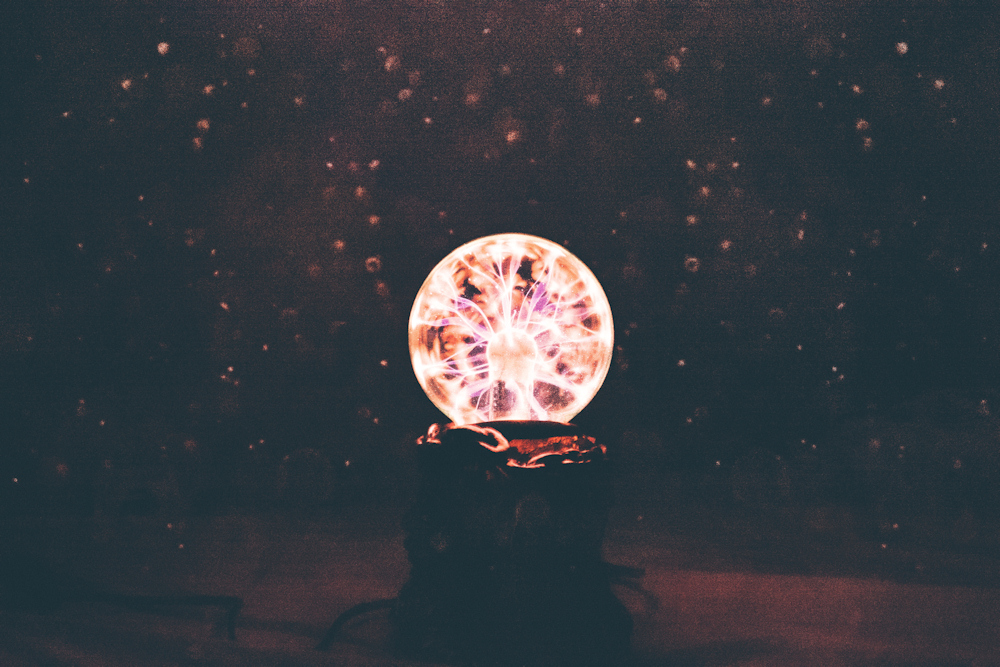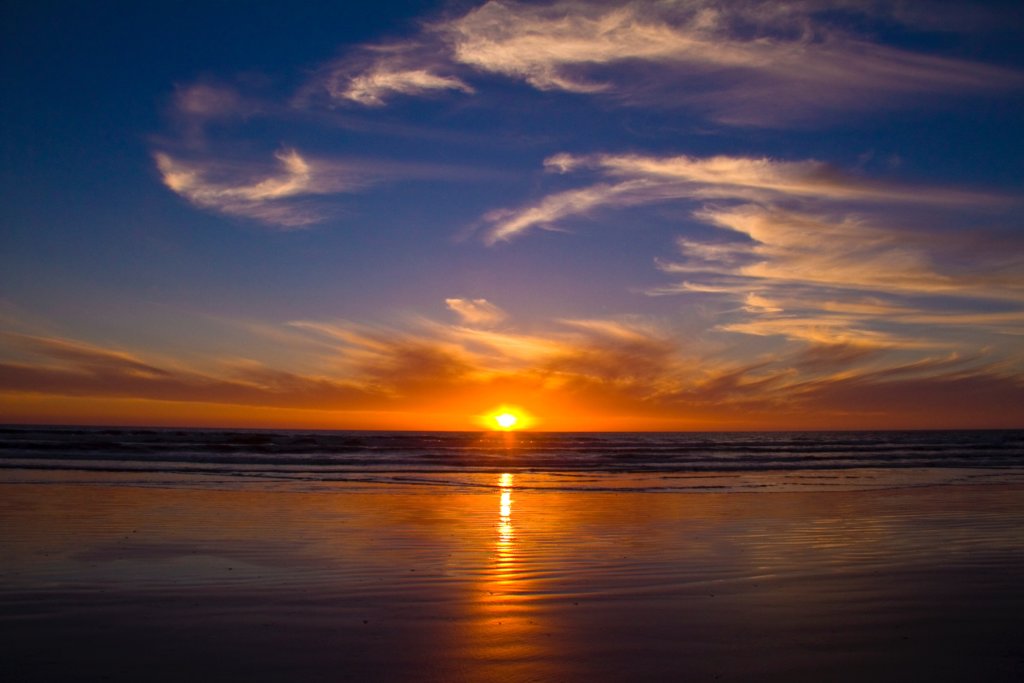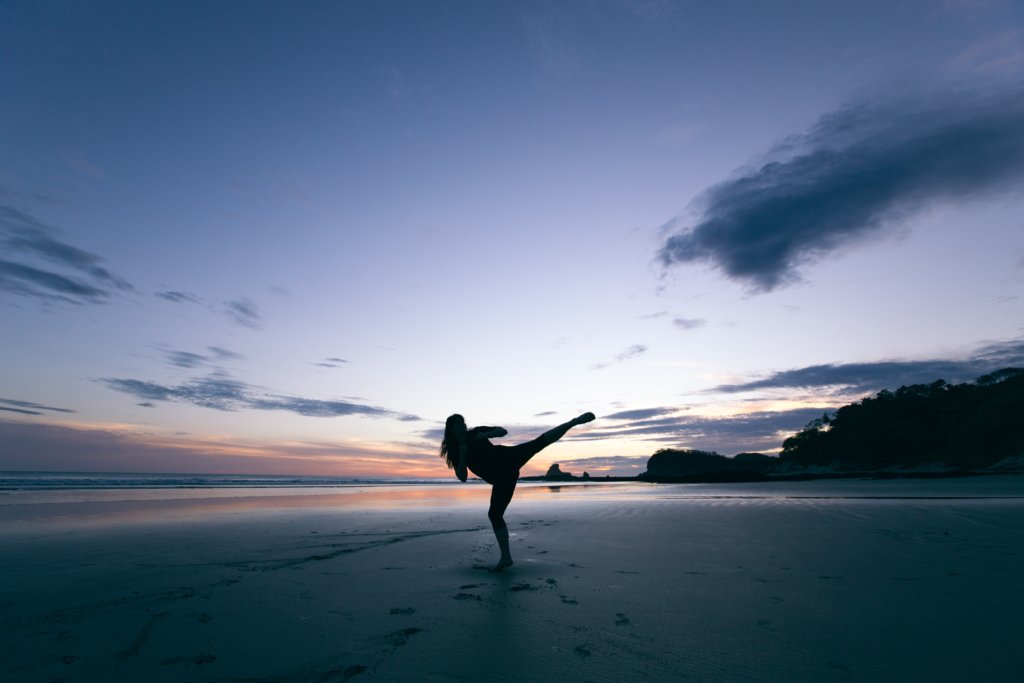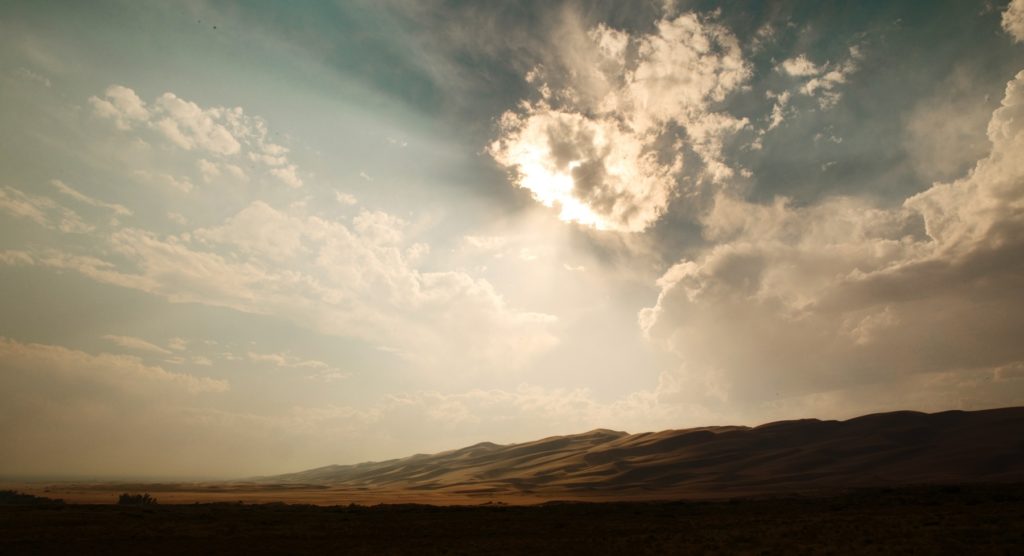Something happened to me this past week that threw me for a loop. I spiraled into a lot of fear and insecurity, projecting the worst possible outcome. Despite having a blog called “Another World is Probable,” for my own life, my first impulse is doom and gloom. When I’m in this emotional place, I lose all rational faculties and feel utterly alone, despite all evidence to the contrary.
I had an experience on Saturday that pulled me out of that hole and helped me change my perspective. My friend Rachel Kaplan launched her podcast, “The Healing Feeling Sh*t Show.” I highly recommend checking it out, by the way. It’s all about emotional potty training for adults. I attended the launch party by myself, anticipating I’d see familiar faces in the crowd, but no one I’d spent much time with. While hobnobbing, I spotted not one, but three people I hadn’t seen in years. It felt like a gift, a synchronistic delight, to anticipate aloneness but instead have the opposite experience.
I realize some of you will scratch your heads because after all, don’t Rachel and I have friends in common and therefore wouldn’t it make sense I would see them at her launch party? Yes, yes it would. But wait! There’s more. I ordered a Lyft home and the driver was also a friend of mine! That’s literally never happened to me before.
I bring this up because all of these synchronicities reminded me life is magical, that there is an intelligence at play in the universe. It reminded me I may think I’m alone and under-resourced, but in actuality I have a wealth of care and support at my fingertips. There is an inherent love for me that I cannot fathom or anticipate.
Despite the numerous magical experiences in my life, I usually think they’re a fluke. I think the synchronicity is a one-off, something never to be repeated. My experience from Saturday night illustrated to me how wrong that is. Magic, synchronicity, and care is more the norm than it is the exception. I regularly have these experiences. Not so regular I can predict their occurrence, but regular nonetheless.
I’m not alone in this. I know many people experience synchronicity and what could be called a coincidence. For me, today, I’m taking it as evidence of a loving higher power. An entity that acts benevolently, that orchestrates things in such a way that I’m taken care of, and also shows me from time to time that I’m not alone, that there are greater forces at work in the world that I’m often unaware of.
My spiritual tradition corroborates this. Over and over again my spiritual teacher says the divine loves us more than we can imagine. Loves us so purely, completely, and unconditionally our human brains are unable to comprehend the depth and breadth of love. But it’s up to us to recognize it.
I dream of a world where we realize we are not alone. A world where we recognize there is a greater, benevolent force at play in our lives. A world where we remember we are loved deeply and completely and that means we’ll experience magic from time to time.
Another world is not only possible, it’s probable.
This topic has come up in at least three conversations with people in the last week so I’m taking it to mean it would be a good topic to blog about. It’s a bit of a departure from what I normally write, but that happens sometimes.
Approximately 10 years ago I learned of EFT, also known as emotional freedom technique, or tapping. The process combines the use of acupressure with psychology. Tapping with the fingertips on specific meridian endpoints of the body helps to calm the nervous system, rewire the brain, and restore the body’s balance of energy. I found the practice to be sort of helpful. I felt better after tapping, but nothing really changed for me. I still carried around a lot of fear, my health didn’t improve, my finances didn’t change, I remained single. It wasn’t the magic pill I was hoping for. So I stopped tapping.
More than a month ago, I heard an interview with Jessica Ortner, one of the big names in tapping, and decided to try again. I picked up the book by her brother Nick Ortner, called The Tapping Solution, and read his section on pain. He asked the question, “Is there an emotion associated with the pain?” As someone who is extremely psychosomatic, this question is a game-changer for me. At the time, I had painful menstrual cramps – that didn’t abate with painkillers or a heating pad or any of the things I usually try. I asked myself, “Is there an emotion associated with this pain?” and the answer was “sadness.” I started tapping all of the acupressure points while I said out loud, “All this sadness in my uterus, all this sadness in my uterus. I’m releasing it and letting it go now.” Tears streaked down my cheeks as I cried over something that happened to me a long time ago, that I thought I was over.
I kept tapping until I felt better, and wouldn’t you know it, no more menstrual pain. I tried it for other things too. My feet swelled up due to poison oak and the healing process seemed to stagnate. I asked myself the question, “Is there an emotion associated with the swelling in my feet?” and the answer was “anger.” So I tapped through that too, and then the next morning my feet returned to normal size. I think most of us are aware of the mind-body connection, but I was surprised at how a specific body part can store an emotion, and how that emotion can linger in place for years.
I share all this because perhaps the recurring back pain or rash that won’t go away, or whatever, is your body telling you something. Maybe there’s an emotion there asking to be felt and the pain or symptom won’t go away until it’s been addressed. I’m a stubborn gal so it’s no surprise my body is too. The beautiful and magical thing though is with just a few minutes of tapping, we can feel the emotions, release them, and let them go.
I dream of a world where let go of stored emotions. A world where we recognize sometimes pain carries a feeling and we can take the time to feel the emotion and then move on. A world where we use all the tools at our fingertips to help ourselves heal.
Another world is not only possible, it’s probable.
All week I’ve bobbed along on an ocean of grief, coming in and out of numbness. Another community member of mine died, a monk from my yoga and meditation group. He had cancer so it wasn’t altogether unexpected, but still sad. I cried when I first heard the news and then I thought I was over it. Until I noticed I checked my email, facebook, and instagram a million times trying to dodge my grief. How I wanted to escape my life and be in someone else’s. Who wants to feel grief? Grief sucks.
In texting with a friend, I realized I have resistance to grieving, not only about this monk, but other losses in my life, because if I do, that means I’ve fully let go. It’s a real and final goodbye. And in order to keep the person a presence in my life, I’ve tried to block my feelings. Like a child who says, “If I don’t say goodbye to you then you can’t leave, right?” But they have and can and do. Whether I say goodbye or not doesn’t matter. And even when I do say goodbye, even when I know a person is knocking on death’s door, it still doesn’t mean I’m ready to bid them adieu. Is anyone ever truly ready to say goodbye to someone?
When I was much younger, I remember trying to comfort my dad after someone died. I tried to console him with the notion that we’re all still connected. That just because a person has left their physical body doesn’t mean the relationship has severed. Nor does it mean we won’t reunite, especially as he and I believe in reincarnation. I’ll never forget, he countered with, “Yeah, but we’ll never meet each other again in this life.” That’s what grief is; recognizing and honoring that loss. No amount of saying, “You’ll see each other again,” can sidestep the loss.
So I’m crying in fits and spurts. I’m also contemplating what my spiritual teacher said about the dissolution of ego. How many people are scared of merging with something bigger than themselves because they view it as annihilation. To describe the process he uses the metaphor of a salt doll and the sea. He says, “If a salt doll goes to measure the sea, it will melt into it. Neither can it measure the sea, nor will it ever return; its existence will merge into the vastness of the sea, releasing it from all cares and worries. If one wishes to take the form of the sea, one will have to become the sea itself; there is no other way.”
If I wish to continue progressing in this life, I have to become the sea itself. I have to let go. To feel the feelings that I’m blocking. And in doing so, I’ll come upon something bigger than me. The salt doll becomes the ocean. Perhaps the grief I feel is carrying me toward something else, something bigger that I’m unaware of. And instead of the loss of my friends as final, maybe I’m traveling to a place altogether new. I’m not sure. Only time will tell.
I dream of a world where we allow ourselves to grieve the dead. A world where we realize the relationship changes into something new. A world where we surrender to the process we’re undertaking and allow ourselves to be swept away, letting go of the old and embracing the new.
Another world is not only possible, it’s probable.
I am pissed at God right now. In fact, “pissed” is too moderate a word. More like livid. I am livid at God right now. If God were embodied as a single person, they would not want to meet me in a dark alley. I’m angry for a multitude of reasons that are not necessary to enumerate here because they’re not so important to anyone other than me.
This is not a post about how everything works out in the end, how everything happens for a reason, etc., although on most days with most things I believe that. This is a post about how not only is anger allowed, but anger also leads to God. I’m dropping the “G” word a lot here, but that’s because in my anger I’m funneling it in one direction and for better or for worse, “God” often has a connotation of personification. It’s hard to feel angry at something vast and infinite. That’s like feeling angry at outer space and I can’t muster up the energy to feel angry at something so impersonal. But I can feel angry at something more contained, and that’s what the “G” word does for me. Maybe that’s not necessary to mention, but I want to explain why I’m using the word I am as opposed to others like “divinity” or “cosmic consciousness” or “Brahma.”
How does anger lead to God and why do I care? I’ll answer the second question first. We so often hear that anger isn’t spiritual, that God is love and if I’m operating from a place of fear, anger, or hatred, I’m disconnecting myself from God. If that belief system works for you, go for it. For me, it doesn’t work. If God is supposed to be everything and everywhere, that means fear, anger, and hatred are also God. It means my anger is allowed and acceptable. It means that anger also creates connection.
That sounds funny, doesn’t it? That anger creates connection. When I think about it though, it’s true. When I’m fighting with someone it may not feel like connection, but to an outside observer, we’re engaging with each other, we’re connecting. The same is true with the big G.
My spiritual teacher says, “Even when you think of God as an enemy, you are involved in Him. Really, our mind is more activated [to think about somebody] by anger and hatred [than by positive propensities]. When we have a quarrel with somebody, we keep on thinking that the next time we meet that person, we will say this or that. Therefore, God will be attained whether you love Him or hate Him.”
That means I don’t have to worry about how I feel. That any of my feelings are “bad” or “wrong” because it’s not like feeling angry at God will curse me forever. And in fact, feeling angry also leads me to where I want to go. These days I’m interested in the full expression of my emotions without judgment or shame. And that means feeling my feelings that are directed toward God as well because even anger leads me to oneness.
I dream of a world where we feel our feelings without reservation. A world where we understand even feeling angry at a power greater than ourselves is allowed. A world where we recognize anger can also lead us to God.
Another world is not only possible, it’s probable.
I’ve burned with anger this week, both from occurrences in my personal world and in our society. Anger shows up to say, “This is not OK,” and there are many things I’m not OK with. I know every spiritual teacher, including mine, says it’s important to cultivate non-anger, that we shouldn’t allow anger to overtake us, and on one level I agree. On another, I don’t.
I am a human being, not a robot, and that means every feeling under the sun I’ve felt, including anger. For me to not feel angry would be an act of suppression and repression. It wouldn’t be real. If I pretended anger never coursed through me, I’d become a passive doormat OK with anything and everything that happened to me. Anger gives me agency. It demonstrates in a visceral way what’s important to me. Anger, like all emotions, acts as a messenger.
I also think about how my spiritual teacher behaved, not only what he said. In practice, he became angry when someone lied, cheated, stole, or disregarded a directive. At the same time, someone else could lie, cheat, steal, or disobey, and he would smile and laugh. Spiritual teachers are complicated and obviously understand every person and situation is different and requires a different response. However, his behavior demonstrates to me he wasn’t attached to anger. Anger could flare up but it could also dissipate easily. One minute he could rage against someone and as soon as they showed contrition, he would soften and shower the person with love. He wasn’t attached to anger, but it still showed up. I mention all this because it’s clear to me anger is a tool that everyone uses.
When I think of my spiritual teacher, I see he used anger with finesse, which is also something I’m learning. If I keep anger locked away in a drawer somewhere, when it comes time to use it, I may hurt myself or those around me because I’m clumsy and inexperienced. I wouldn’t let a toddler handle a knife until they developed more dexterity, and that’s what I think is happening with me right now. I’m becoming more dexterous with anger so I may wield it appropriately as the situation allows.
I also want to express I have a theory as to why spiritual teachers talk about cultivating peace instead of anger. It’s easy to get stuck in a rageful place, to hold a grudge. People become angry, spiteful, and bitter all the time. By not fanning the flames of anger on a macro level, spiritual teachers are pointing us toward subtler emotions, such as love. I’m reminded though, you can be angry at someone you love. That love is big enough to hold anger as well. And expressing anger is sometimes the most loving thing a person can do.
I dream of a world where we allow the expression of anger in a healthy way, even in spiritual circles. A world where we understand anger is a tool in our toolbox and it’s important for us to learn how to use it. A world where we express anger to the degree a situation calls for, and then let it go when it’s time.
Another world is not only possible, it’s probable.
In the more than nine years since I started this blog, I’ve written about impatience approximately a million times. Just kidding, but it does come up a lot. In fact, I wrote about impatience a month ago. What’s interesting is I’m noticing how I’m impatient not only about external factors like my career, but also with my internal states. When I’m sad, I want to be over the sadness as quickly as possible. When I’m afraid, I want to skip to serene as soon as I can.
This week my therapist told me, “You can feel sad as long as you need to feel sad. Take as much time as you need.” In that moment I realized even though I’ve recently starting allowing myself to feel all my feelings, I’ve still added in a time element. I want to move through them as quickly as possible, and that often means I don’t feel them fully because it’s a rush job. If you’re painting a house and slap on some paint as quick as can be, it’s bound to happen that you miss a few spots. A thorough job takes time and that’s precisely what I haven’t been giving myself. Instead, I’ve been giving myself a whole lot of judgment.
I watched a television sitcom the other day that had a funeral scene, and I started crying because it reminded me of my co-worker. My first response was, “Really? It’s been four months. You’re still sad? You didn’t even know him all that well.” And my next response was, “OK, go ahead and cry,” but it held a tinge of someone standing next to me, tapping her foot, waiting for me to finish. So much of my life is like that right now, tapping my foot, waiting for the next thing on a small scale as well as a large one. I’m counting down the hours until I have to take my next pill, or have to leave to catch the bus, or when my health will improve, or when my dreams will come true.
I could easily veer into the beauty of staying present, of being where my feet are, but while related, instead I’m valuing spaciousness and ease. I’m starting to give myself permission to take all the time I need. To not rush my internal process. To stop giving myself self-imposed deadlines of when I should feel better or my life should look different than it does. Deadlines are helpful for some things, but in others they’re detrimental.
My spiritual teacher says, “Suppose, immediately after planting some saplings and seeds, someone digs them up to find out if they have taken root or sprouted. That would not be considered wise.” I always thought he meant literal saplings and seeds, and he likely did, but now I’m understanding we have internal saplings and seeds too. And for those as well, I have to wait for them to take root and sprout.
I dream of a world where we give ourselves the time and space we need. A world where we no longer rush our internal processes or judge ourselves harshly about where we think we’re supposed to be or how we’re supposed to feel. A world where we recognize the value of internal spaciousness.
Another world is not only possible, it’s probable.
The other week I wrote that all any part of me wants is love and presence. Ever since I said, “I love you” to my fearful part, it’s as if I triggered a rock slide, and now other parts are popping up and saying, “What about me? Do you love me, too?”
The practice is a difficult one because so much of my life has been geared toward fighting, toward struggling, to talking back. For instance, if I think I’m fat, my response will be, “No you’re not.” I don’t allow for the thought to even exist. Since the other week though and learning to love a part I previously only pushed away, instead of fighting back, I’m saying, “OK Rebekah. So what if you are? I love your body no matter what. If it’s fat, if it’s thin, if it’s not functioning the way you want it to, I love it, and you anyway.”
I feel vulnerable even typing that because it’s true, what I long for is unconditional love and I’ve withheld it from myself in a never-ending quest toward an unattainable ideal. I think there’s also a fear if I shower myself with unconditional love that I’ll become an inert blob, but the truth is, love doesn’t mean constant indulgence. Love means compassion, understanding, acceptance, allowance. It means saying to myself, “I see you as you are, right now, and I love you anyway.” From that place, real change and transformation occurs. Loving my fearful part didn’t make me more afraid, quite the opposite. Loving my fearful part gave me a sense of relief and peace unlike any I’ve experienced before.
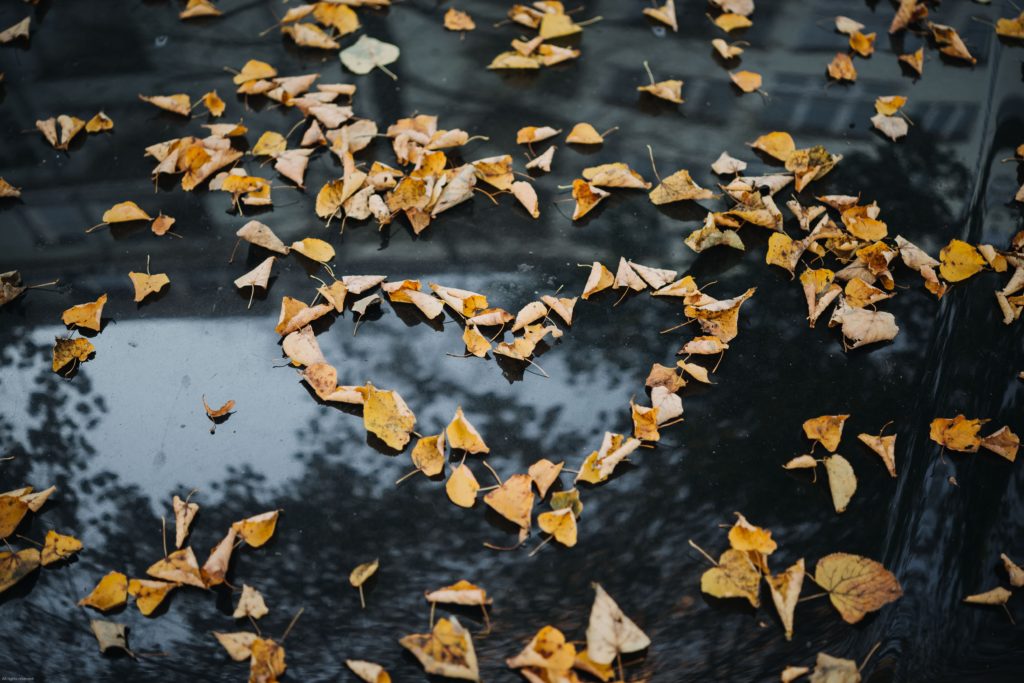
Can I love it all? I’m working on it. Photo by Roman Kraft on Unsplash.
My spiritual practice promotes the cultivation of love. Of viewing everything as an expression of an infinite loving consciousness, of trying to grow the internal feeling of love. Our goal is to love all living beings and to merge ourselves in the source of that feeling. To swim in an ocean of love. The thing is though, if I keep believing some parts of me are not worthy and deserving of love, there’s no way I can give myself over to that ocean. It’s like saying, “Your legs are allowed to wade into the water, but your arms have to stay dry.” I can’t experience complete merger until I’m completely submerged.
What I’m coming to here is recognizing, again, all parts of me want love. My body wants love, my mind wants love, my emotions want love. The cool thing is I can give that to myself. I don’t have to wait for some imagined future that may never come. I don’t have to wait for someone else to come along and say, “I love all parts of you unconditionally.”
If you had asked me five years ago whether I loved myself, I would have said yes because I said affirmations and treated myself with kindness. I checked all the boxes people listed when they spoke of self-love. Now though I’ve reached a new level of love because it’s not just looking in the mirror and saying I love you. It’s saying I love you to the part of me that says mean things. It’s saying I love you to the part of me that’s disappointed. It’s saying I love you to everything, regardless of my judgment of the part. Now the answer to the question, “Do you love me, too?” is “Yes.”
I dream of a world where we love all parts of ourselves, even the parts we don’t particularly like. A world where we recognize every part is worthy and deserving of love. A world where we work toward loving ourselves unconditionally.
Another world is not only possible, it’s probable.
Fear is an interesting emotion. In our society, we treat it like a plague – something to cure, attack, avoid. We say, “Screw fear,” or, “Don’t let fear get in the way.” Oftentimes our message about fear is simpler: “Don’t be scared,” as if telling someone to stop being scared could stop them.
In my own relationship with fear, I’ve also treated it like an annoying inconvenience, or an enemy to defeat. For many years I used food to anesthetize myself. Or I escaped into fantasy, books, movies, television. When I realized none of those things would fix my fear, I started using other methods like affirmations, tapping, visualization, etc. Basically, whatever I could do to not feel afraid, I did. And every time I realized fear hadn’t left, I felt discouraged, disappointed, as if I’d failed. As if fear had won and thus I’d lost.
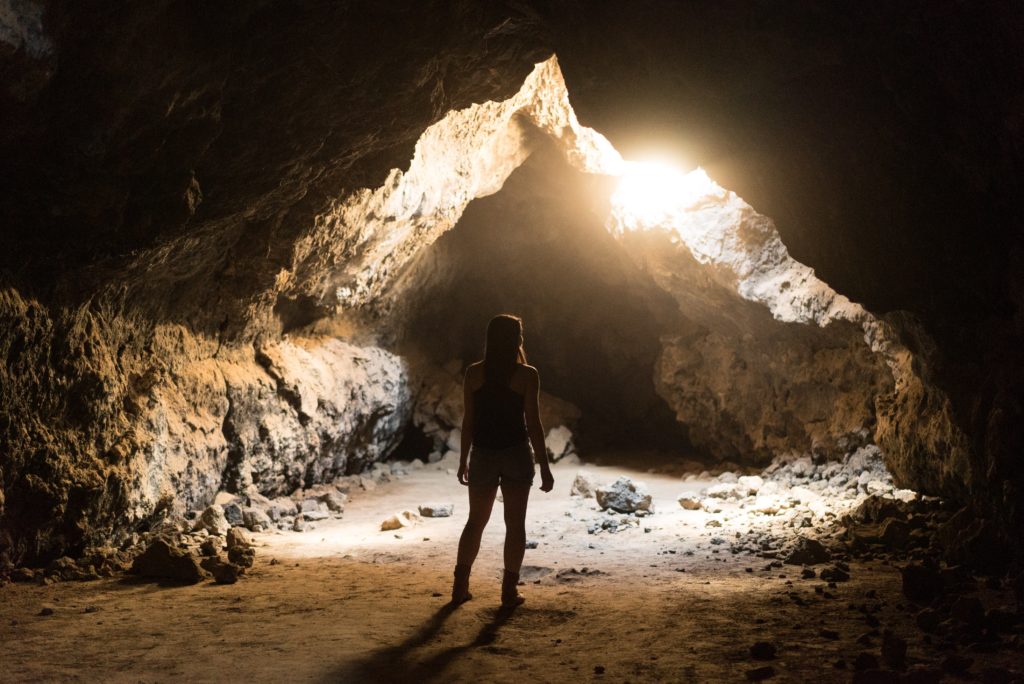
We must enter the cave that we fear. Photo by Joshua Sortino on Unsplash.
The other week, intense fear reared its head in response to the fires north of me. I could see smoke drifting into San Francisco and some days it wafted into Oakland as well, creating a preternatural calm, a sun so hazy and orange I could look at it directly. Fear came up for many reasons, one of them an acute sense of powerlessness. I bought a mask to protect my lungs from the smoke, but I couldn’t control whether the air remained smoky.
In my therapy session, I noticed I wanted my therapist to fix and solve my fear. I wanted him to take it away from me, to make it better. Instead he suggested I sit with it. I’m not sure what happened in the session because days prior I tried the same thing and just couldn’t, but during the session I finally stayed still. I let fear wash over me saying, “It’s OK. It’s OK that you feel afraid. It makes sense. It’s understandable.” For two days, fear erupted from me like a volcano, not due to any thoughts in particular, rather the feeling of fear itself. My heart palpitated, my breathing quickened. I tried all my usual tricks to no avail until I again said, “OK. I’m here with you. I won’t leave you alone with your fear.” And then at group meditation last week I said to my fearful part, “Not only is it OK that you’re here, but also, I love you,” and that brought on the tears.
All every part of me wants is love and presence. I can’t ditch fear and anxiety. As a human being I will inevitably feel scared and anxious again, but since I said, “I love you” to my fearful part, I feel fearless. Not because I’m without fear, but rather because I know when fear pops up again, I’ll allow it, I’ll sit with it, and I’ll say I love you. And then the fear will pass like a storm cloud.
My spiritual teacher says if a person takes shelter in the divine, one need not be afraid of anything. He says, “[F]ear requires two entities for its expression – the one who fears and the cause of fear. Where there is only One entity, because there can be no cause, fear cannot exist.”
In the past, I would have taken that to mean I’m not meditating enough because I still have fears. For today at least, I’m recognizing by loving my fearful self, I am taking shelter in the Cosmic Consciousness. I’m recognizing this fear, too, is a part of me, a part of God, and the way to dissolve fear is by showering it with love.
I dream of a world where we treat our fearful selves with love. A world where we recognize we are not at war with fear, but rather fear is like a small child, begging for affection. A world where we embrace our fearful parts, give it as much love as possible, and in that way become fearless.
Another world is not only possible, it’s probable.
What a week. Lots of grief on a societal level, but also a personal one. I’m reminded of how human we are. Of how we’re all in this together. As Ram Dass says, “We’re all just walking each other home.”
His quote kept ringing through my head this week. In times of trauma and grief, I want to do something. Sometimes there are actions to take, but sometimes all we can do is hold each other while we cry.
With painful feelings, I’ve often wanted someone else to take them away. To siphon them off as they would drink the last of a milkshake. I wanted someone, anyone, to make me feel better. Speaking as someone with loads of experience trying to escape her feelings, I can say without a doubt the answer is “That’s not possible.” No one else can cry my tears for me. No one else can take away my pain. Other people and things may distract me for a while, but just as with storm clouds, they darken the sky whether I acknowledge them or not.

Walk with me? Photo by Hannah Donze on Unsplash.
Ram Dass’ quote reminds me no one is supposed to take away my pain and sorrow because we are all humans. We are not machines. We can’t write a code that says, “We will never feel sad ever.” Furthermore, it’s no one’s responsibility to make me feel better. We are fellow companions on this path. We are pilgrims going on a pilgrimage. There may be times I sprain my ankle and have to rely on others for help, but the responsibility for forward motion is still mine, and the responsibility to move through my emotions is still mine.
My spiritual teacher says, “[A] true society is like a group of pilgrims who attain a deep psychic affinity while traveling together, which helps them solve all the problems in their individual and social lives.”
That’s us. A group of pilgrims traveling this rocky path together. I’m speaking in metaphors a lot in this post, but what I’m trying to get at is it’s not my responsibility to solve or fix someone’s emotional state, or vice versa. I don’t have all the answers, or any of the answers, really. I can’t tell a person how to live their life or what they should do to feel better. All I can do is say, “I hear you and I’m beside you. I’m walking this path with you as a companion.” And that’s it. We’ll address problems as they arise – blisters, sprained ankles, etc. – but the emotional states? I’ll be with you during them, but the tears are still yours to cry and the steps are still yours to walk. And maybe that’s enough.
I dream of a world where we recognize we are all pilgrims on a pilgrimage. A world where we sit with each other when we’re in pain. A world where we realize all we can do is be there for each other. A world where we remember we’re all just walking each other home.
Another world is not only possible, it’s probable.
When my co-worker died unexpectedly about two months ago, it rocked me. It shook my sense of stability and security, and I’ve been working hard to get back to feeling safe and secure ever since. Unfortunately, all of my usual methods haven’t worked. I still feel insecure and life still doesn’t feel stable.
I spoke with a friend about this and she reminded me life isn’t certain. We pretend it is, but it’s not. We think we know what will happen next, but we don’t. Usually that notion fills me with anxiety because when the outcome is uncertain, I err on the side of negativity. I know, that’s funny considering this blog is called “Another World is Probable” and I spend so much time talking about a bright future, but it’s true. For myself, I assume the worst – rejection, scarcity, death. On a visceral level, gazing into my future I foresee death, destruction, and despair. It makes sense then why I want to keep uncertainty at bay. The way I’ve done so is to plan. I plan for joy, for connection, for the future. That way I know I’ll engage in something pleasant. Or at least, that’s what I told myself. And it mostly worked, except also not really because I’m sure you’ve heard that saying, “When we make plans, God laughs.” Most often my plans went awry, but I made them anyway and I quelled my anxiety for the most part. I could be certain of most things and that was fine by me.
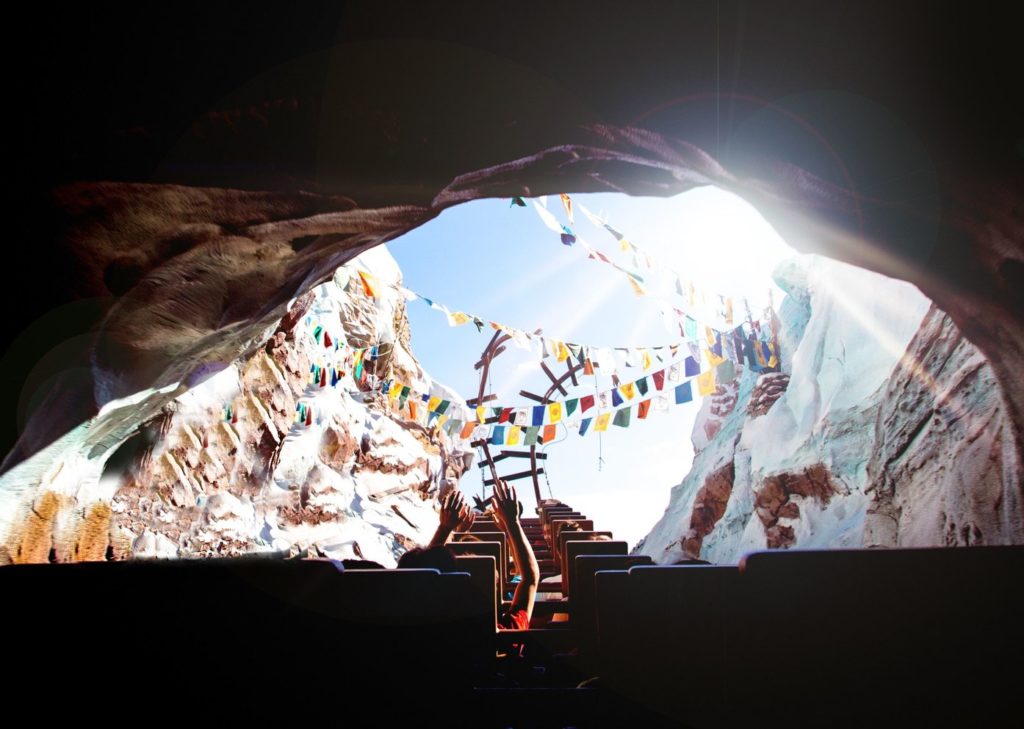
We’re on the biggest thrill ride of them all. Photo by Park Troopers on Unsplash.
When my co-worker died, my notion of certainty shattered. I couldn’t keep pretending life could be certain, no matter how much I planned. His death was not something I anticipated. Nobody gave me advanced warning. He was here one day and gone the next, and that hurts.
In this moment I’m grieving him, and I’m grieving the loss of certainty. What my friend reminded me though is that doesn’t have to be a bad thing. Good things are uncertain too. A new relationship, a new job, a new life are also things we cannot predict. We pretend we can by applying for new jobs, scouring dating websites, and having unprotected sex, but we don’t control what the company is, who we’ll fall in love with, or when we’ll get pregnant. We make an effort, we do the footwork, but when any of those things manifest is ultimately a surprise.
In December, friend and Soul Couch Jayantii Lawless told me she wished I felt thrilled. Not about anything in particular, not like she wished I felt thrilled about dinner that night, rather that I had the experience of “thrill” in general. I laughed and said, “Yeah, me too.” I envisioned “thrill” in the form of falling in love, but instead, the universe is illustrating life itself is thrilling. We are on a roller coaster replete with peaks and valleys. The roller coaster will go up and it will come down. The future is just as likely to be awesome as it is awful. It’s important for me to remember that because anticipating the future will be terrible isn’t working for me. I’d rather anticipate the future will be terrific because that’s just as likely.
I dream of a world where we recognize uncertainty can be exciting. A world where we remember it’s just as likely pleasant things will happen to us as unpleasant ones. A world where we realize life is the biggest thrill ride of them all.
Another world is not only possible, it’s probable.
